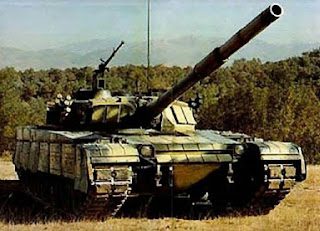The designations Al-Khalid and MBT-2000 refer to the Pakistani and Chinese variants of a modern main battle tank developed during the 1990s by China and Pakistan. The Al-Khalid has been in service with the Pakistan Army since 2001, while the MBT-2000 is built and marketed internationally by China and was recently trialed by the Peruvian Army for possible acquisition.
Operated by a crew of three and armed with a 125 mm smooth-bore tank gun that is reloaded automatically, the tank uses a modern fire-control system integrated with night-fighting equipment and is capable of firing many types of anti-tank rounds as well as guided anti-tank missiles. Al-Khalid is named after the legendary Muslim general Khalid bin al-Walid.
An evolution of Chinese and Soviet tanks, the design is considerably smaller and lighter than most Western main battle tanks. It is based on the Chinese Type 90-II, which combined technologies from several Soviet/western tanks. Al-Khalid is viewed as the "ultimate" evolution of the successful Soviet T-54 system. The Al-Khalid is unusual in that it is was designed to be adaptable for manufacture, so that it can be easily integrated with a variety of foreign engines and transmissions. The current production variant of Al-Khalid utilises a diesel engine supplied by the KMDB design bureau of Ukraine. The first production models entered service with the Pakistan Army in 2001 and there are plans to induct approximately 600 in total.
Peru leased five VT-1A from China for trials in 2009. The Peruvian government has expressed interest in purchasing 80-120 units to complement the fleet of Soviet T-55 tanks in service with the Peruvian Army.


